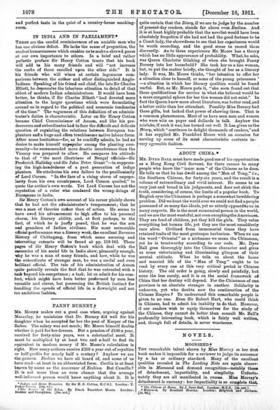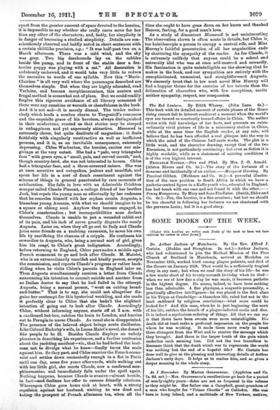NOVELS.
MOONSEED.1-
THE remarkable talent shown by Miss Murray in her tint book makes it impossible for a reviewer to judge its successor by a lax or ordinary standard. Many of the excellent qualities revealed in The Leading Note are again observ- able in Moonseed and demand recognition—notably those of detachment, impartiality, and simplicity. Unfortu- nately they are all manifested in cream Miss Murray's detachment is uncanny : her impartiality is so complete that, • The Chinese at Home. By J. Dyer Ball. London: H.T.S. [5s. set.] Moonseect. By Rosalind Murray. London : Ehdynek and. Jackson. [Ss. f3d.] apart from the greater amount of space devoted to the heroine, it is impossible to say whether she really cares more for her than any other of the characters; and, lastly, her simplicity is in danger of becoming a studied simplicity. Details are con- scientiously observed and baldly noted in short sentences with a certain childlike precision, e.g.: "It was half-past two on a March afternoon. There was a cold wind, and the sky was grey. Two big deerhounds lay on the cobbles beside the pump, and in front ef the stable door a fox- terrier puppy was playing with a cat." All decoration is sedulously eschewed, and it would take very little to reduce the narrative to words of one syllable. Now this " Marie- m "is all very well where the personages described are themselves simple. But when they are highly educated, read Verlaine, and become morphinomaniacs, this austere and frugal method is somewhat out of place- But we could readily forgive this rigorous avoidance of all literary ornament if there were any sunshine or warmth or cheerfulness in the book. And it is not sad—it is merely dismaL The tender melan- choly which lends a sombre charm to Turgenieff's romances and the-exquisite grace of his heroines, always distinguished in their misfortune, remind us that stories may be steeped in unhappiness and yet supremely attractive. Moonseed in extremely clever, but quite destitute of magnetism : it deals faithfully with singularly unattractive as well as inefficient persons, and it is, as an inevitable consequence, extremely depressing. Chloe Warburton, the heroine, excites our mis- givings at the very outset. She had a " pale, very triangular face" with green eyes, a' small, pale, and curved mouth," and, though country-bred, she was not interested in horses. Chloe had a triangular face, and a three-cornered nature. She was at once secretive and outspoken, jealous and unselfish, and spent her life in a. sort of dumb resentment against the scheme of things in general punctuated by rare moments of exhilaration. She falls in love with an Admirable Crichton manqué called Claude Pincent, a. college friend of her brother Jack, but repels the young man so effectually by her rudeness that he consoles himself with her orphan cousin Augusta, a blameless young Amazon, with what we should imagine to be a square or oblong souL Anyhow they become engaged, to Chloe's consternation ; but incompatibilities aeon declare themselves. Claude is unable to put a wounded rabbit out of its pain, and his lack of nerve greatly disgusts the manly Augusta. Later on, when they all go out to Italy and Claude joins some friends on a yachting excursion, be saves his own life by sacrificing the chances of a cripple. He confesses his cowardice to Augusta, who, being a normal sort of girl, gives him his wag to Chloe's great indignation. Accordingly, before returning to England,. Chloe persuades a middle aged French economist to go and look after Claude. M. Matelet, who is an extraordinarily unselfish and kindly person, accepts the commission, and reports Claude's progress or rather back- sliding when he visits Chloe's parents in England later on. Then Augusta simultaneously receives a letter from Claude announcing his intention to commit suicide and another front an Italian doctor to say that be had failed in the attempt. Augusta, being a normal person, "went on cutting bread- and-butter." That is to say, she could not altogether dis- guise her contempt for this hysterical weakling, and she made it perfectly clear to Chloe that she hadn't the slightest intention of going out to look after Claude. Accordingly Chloe, without informing anyone, starts off at 2 am. with a cardboard hat-box, catches the train to London, and hurries out to Perugia to nurse Claude. As usual she is disappointed. The presence of the beloved object brings acute disillusion. Like Colonel Enderby's wife, in Lucas Malet's novel, she doesn't like people to be ill. Besides Claude displays an unholy pleasure in describing his experiences, and a further confession about the yachting accident—viz., that he had bribed the boat- man not to divulge what he knew—finally turns the scale against him. So they part, and Chloe marries the French econo- mist and settles down contentedly enough in a flat in Paris until one day, some five years afterwards, while walking out with her little girl, she meets Claude, now a confirmed mor- phinomaniac, and immediately falls under the spell again. Nothing happens, because Claude is evasive—almost hostile, in fact—and declines her offer to resume friendly relations. Whereupon Chloe goes home sick at heart, with a strong repulsion against her husband, wishing he was dead and hating the prospect of French afternoon tea, when all the
time she ought to have gone down on her knees and thanked Heaven, fasting, for a good man's love.
As a study of discontent Moonseed is not uninteresting The observation shown is often acute in details, bat Chloe is. too kaleidoscopic a person to occupy a. central ras, and Miss Murray's faithful presentation of all her angularities ends by shattering the sympathy of the reader. As for Claude, it is extremely unlikely that anyone could be a school and university idol who was at once self-centred and cowardly. His fascination is quite unintelligible on the showing that he makes in the book, and our sympathies are entirely with the unsophisticated, unmusical, and straightforward Augusta. We sincerely trust that in her next novel Miss Murray will find a happier theme for the exercise of her talents than the delineation of characters who, with few exceptions, excite neither sympathy, respect, nor compassion.



















































 Previous page
Previous page